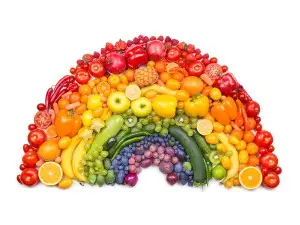October is Breast Cancer Awareness month, and the Yolanda G. Barco Oncology Institute works tirelessly to treat breast cancer patients and improve measures to identify those who are considered to be at high risk for the disease. Much of what determines that can be traced back to genetics, i.e., there is a family history of breast cancer, but what about lifestyle decisions that might make someone more susceptible to breast cancer, or some other form of cancer?
Nearly 30-40% of cancer diagnoses and death (aka, the “cancer burden”) are directly connected to lifestyle risk factors, according to the World Health Organization. This includes, among other things, tobacco use, alcohol consumption, a diet low in fruit and vegetables, obesity, and physical inactivity. How can one reverse the trend on unhealthy habits and nutrition to help prevent cancer and other disease?

“Overall, I would say that emphasizing a diet rich in color and variety is important for any chronic disease prevention,” says Stefanie Arblaster, RDN at Meadville Medical Center’s Mind-Body Wellness Center. “There are many specific phytochemicals in certain fruits and vegetables that are shown to help prevent cancer, and these ones are specific to breast cancer research:”
Phytoestrogens, which are estrogen-like compounds derived from plants have shown benefits in reproductive and heart health, and more importantly on the subject of breast cancer, hormone-dependent tumors. These compounds are found in foods like soybeans, soybean products, flax, and whole grains.
Carotenoids are pigments like yellow, orange, red, and purple found in foods like carrots, sweet potatoes, cantaloupe, spinach, tomatoes. This is the color palate of your diet! Research shows that carotenoids have been associated with reducing the risk of cancer and stimulating the immune system.
Other lifestyle and dietary changes include cutting back on certain foods and drinks while increasing your daily activity. Specifically, Stephanie suggests:
- Replacing animal-based protein with more plant-based sources, which has been shown to decrease the risk of breast cancer. This means instead of red meat, poultry, deli meat, and similar foods, try tofu, beans, legumes, nuts, and seeds.
- Drinking alcohol has been shown to increase breast cancer risk, so stay within the general recommendation of no more than 1 drink per day, especially for women.
- Leading a physically active lifestyle can help reduce breast cancer risk. Aim for 30-60 minutes per day, even if that is collectively any physical activity, like walking, running, weight lifting, yoga, etc.

Following better dietary and lifestyle choices does not automatically prevent disease, nor does it mean that if you haven’t made the best decisions with food, exercise, or alcohol and tobacco use that you will automatically get breast cancer. To understand your true breast cancer risk assessment, talk to your primary care provider about your family history and undergo an assessment based upon that as well as your breast density and other factors. Preventative recommendations from the medical community continue to change based upon research. The Yolanda G. Barco Oncology Institute’s award-winning Director of Breast Oncology Services, Dr. Gurleen, Pasricha, MD encourages breast awareness and screenings, fully supporting the new recommendations for annual mammograms to begin at age 40 for women not currently considered high risk.
Breast awareness and other preventative measures, like good nutrition and healthy lifestyle decisions, begin with YOU! Try this checklist from the American Institute for cancer research, for a 30-day challenge, recommended by Bethany Say, RD, LDN, CDCES, to help you develop healthy choices to reduce your risk of cancer. Also, consult the resources below for further information about nutrition and services offered by MMC.
Additional Resources
Breast Cancer Risk and Nutrition
Susan G. Komen Foundation: Breast Cancer Risk Factors with Lifestyle and Diet
American Institute for Cancer Research: Using Healthy Eating to Lower Cancer Risk
Meadville Medical Center Providers
Primary Care Providers: https://www.mmchs.org/services/family-medicine/
Providers Accepting New Patients: https://www.mmchs.org/resources/providers-accepting-new-patients/
Meadville Medical Center Services
Cancer Treatment: https://www.mmchs.org/services/cancer-treatment/
Nutrition Services: https://www.mmchs.org/services/nutrition-services/


